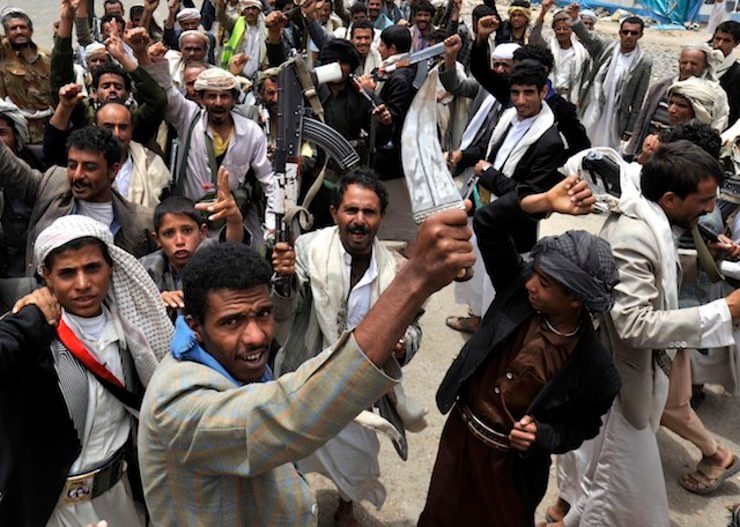SUMMARY
This is AI generated summarization, which may have errors. For context, always refer to the full article.

SANAA, Yemen – Yemen’s president has offered to appoint a new premier within 48 hours under a potential deal with Shiite rebels in return for ending their protests, sources said Thursday, September 11, after a weeks-long standoff.
A spokesman for the rebels, whose protests have raised fears of worsening unrest in the Arabian Peninsula country, said they were considering the offer.
“An accord was reached… late on Wednesday” to end Yemen’s latest political impasse, by which “a new prime minister will be named within 48 hours” and fuel prices will be cut further, a presidency source told Agence France-Presse.
Another source in the office of President Abdrabuh Mansur Hadi said it was an “understanding over an agreement that will be finalised by (UN envoy Jamal) Benomar”, who arrived Sanaa on Thursday.
Gulf Cooperation Council envoy Saleh al-Qunayeer had also arrived in Yemen “to back efforts aimed at easing tensions”, a GCC statement said.
Hadi promised in an initiative rejected by the Huthi rebels earlier this month to name a new prime minister.
The rebels, known as Huthis or Ansarullah, had been demanding that Hadi consult them before naming a new prime minister. It was unclear if this has been agreed in the overnight accord.
Under the draft deal, the rebels are to “dismantle their protest camps and pull their armed men” from Sanaa and its surroundings, one of the presidency sources added.
Shiite Huthi activists launched their protest campaign in late July after the government announced a hike in fuel prices.
Under the latest agreement, the increase will be cut in half, after a 30% decrease took effect last week.
A Huthi spokesman told Agence France-Presse that “there are proposals to resolve the crisis that are still being considered” amid a “positive” atmosphere.
But there are “no announcements on results” of the talks yet, he said.
Top rebels killed
The rebels set up camps in Sanaa on August 18 and this week escalated their movement.
They clashed with police on Sunday, September 7, after closing down the main road leading to Sanaa airport as well as the ministries of electricity and telecommunications.
On Tuesday, September 9, hundreds tried to storm the government headquarters, sparking clashes with police that left seven protesters and a paramedic dead.
Witnesses said thousands of supporters of the rebels staged a sit-in north of the capital on Thursday to protest against the deaths and demand that their “murderers” be brought to justice.
The Huthis have been battling loyalist forces for months for control of key cities north of Sanaa.
Over the past few weeks, fighting has intensified between rebels on one side, and troops and loyalist tribesmen on the other, across regions neighboring Sanaa.
Four leading Huthi figures were killed Wednesday in fighting in Al-Ghayl, in the northeastern province of Al-Jawf, tribal and Huthi sources said.
Among them was Abu Malek al-Fishi, known for being close to the rebels’ leader Abdulmalik al-Huthi.
Sunni-majority Yemen has been locked in a protracted transition since long-time president Ali Abdullah Saleh was forced from power in February 2012 after a deadly 11-month uprising.
Analysts say the rebels are trying to establish themselves as the top political force in the northern highlands, where Shiites are the majority.
The International Crisis Group warned Monday that “Yemen’s troubled transition is at a crossroads more dangerous than any since 2011”.
The UN Security Council on August 29 called for the camps in Sanaa to be dismantled and for the rebels to pull back from areas they have occupied.
It had threatened sanctions against groups blocking the political transition in the impoverished country.
Yemen is also struggling against Al-Qaeda militants active across several parts of the country, having taken advantage of the collapse of central authority during the 2011 uprising.
On Thursday, a drone strike killed four suspected members of the jihadist network in the southern province of Shabwa, a security source said.
The United States is the only country operating drones over Yemen, but American officials rarely acknowledge the covert program. – Rappler.com
Add a comment
How does this make you feel?
There are no comments yet. Add your comment to start the conversation.